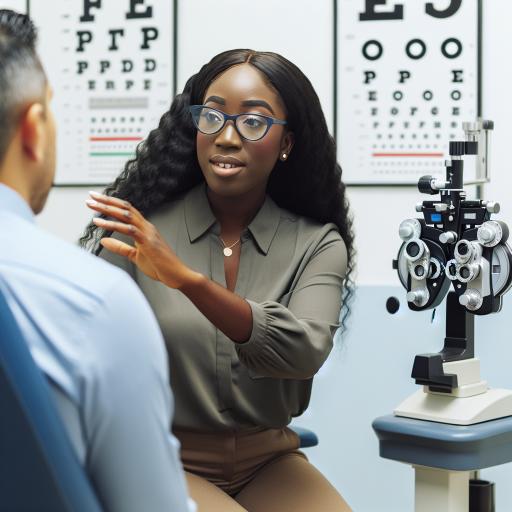Introduction
Nigeria’s healthcare industry plays a vital role in the nation’s well-being and economic growth.
Healthcare professions in Nigeria continue to thrive despite challenges, offering essential services to millions of people.
The demand for skilled professionals keeps rising as the population grows.
Importance of Healthcare Professions in Nigeria
- Medical Doctors: They are the backbone of Nigeria’s healthcare system, diagnosing and treating various conditions.
- Nurses and Midwives: They provide critical care and support, especially in rural areas with limited medical resources.
- Pharmacists: They ensure safe and effective medication management for patients.
- Laboratory Scientists: They conduct essential tests for accurate diagnoses and treatment plans.
- Physiotherapists: They help patients regain mobility and improve their quality of life after injuries or surgeries.
- Community Health Workers: They provide basic healthcare services and education at the grassroots level.
These professions significantly impact Nigeria’s healthcare outcomes, contributing to disease prevention and improved public health.
As healthcare challenges persist, the importance of these thriving professions cannot be overstated.
Investing in training and development remains crucial for sustained growth in Nigeria’s healthcare sector.
Medical Doctor
Medical doctors play a crucial role in the healthcare industry, serving as primary caregivers for patients.
Overview of the role and responsibilities
Medical doctors are highly respected professionals in Nigeria, and the role comes with immense responsibility.
They are often the first point of contact for patients seeking healthcare services.
Medical doctors must possess excellent communication skills, empathy, and sound clinical judgment to effectively diagnose and treat patients.
They work in diverse settings, including hospitals, clinics, and community health centers.
Educational requirements and training programs
To become a medical doctor in Nigeria, individuals must undergo rigorous training and education.
This typically involves completing a bachelor’s degree in medicine and surgery, followed by a one-year internship and a compulsory one-year NYSC service.
After completing these requirements, individuals must pass the Medical and Dental Council of Nigeria (MDCN) examination to practice as a licensed medical doctor.
Job prospects and opportunities in Nigeria
Job prospects for medical doctors in Nigeria are promising, with a high demand for healthcare professionals in the country.
Medical doctors have opportunities to work in both public and private healthcare facilities, including hospitals, clinics, and specialized medical centers.
Additionally, many medical doctors choose to set up their private practice to provide personalized care to patients.
Despite the promising job prospects, medical doctors in Nigeria face several challenges in their daily practice.
The healthcare system in Nigeria is plagued by inadequate infrastructure, limited resources, and a high patient-to-doctor ratio.
This often results in long working hours, limited access to essential medical supplies, and challenges in providing quality care to all patients.
Overall, being a medical doctor in Nigeria is a rewarding yet challenging profession.
Despite the obstacles faced, medical doctors play a vital role in improving the health and well-being of the population.
With dedication, resilience, and a commitment to excellence, medical doctors in Nigeria continue to make a significant impact in the healthcare sector.
Nurse
When we think of healthcare professionals, nurses often come to mind.
Nurses play a vital role in the healthcare system, and in Nigeria, there are various types of nurses with different specialties and responsibilities.
Different types of nurses
- Registered Nurse
- Midwife
- Psychiatric Nurse
- Community Health Nurse
- Pediatric Nurse
Scope of practice for nurses in Nigeria
Nurses in Nigeria have a wide scope of practice which includes:
- Administering medications
- Assisting in surgeries
- Providing patient care
- Educating patients and families
- Collaborating with other healthcare professionals
Training and certification requirements
To become a nurse in Nigeria, individuals must undergo rigorous training and meet specific certification requirements.
This usually includes:
- Completion of a nursing program
- Passing the Nursing and Midwifery Council of Nigeria (NMCN) licensing exam
- Continuing education and professional development
Impact of nurses in the healthcare system
Nurses play a crucial role in the healthcare system and have a significant impact on patient outcomes and overall quality of care.
Some key contributions of nurses include:
- Monitoring and assessing patient health
- Providing emotional support to patients and families
- Implementing treatment plans prescribed by doctors
- Advocating for patients’ rights and well-being
- Participating in healthcare research and quality improvement initiatives
Overall, nurses are an indispensable part of the healthcare workforce in Nigeria, and their dedication and expertise greatly contribute to the well-being of the population.
Read: Comparison: Physician Assistants vs Doctors in Nigeria
Pharmacist
Role of pharmacists in healthcare
Pharmacists play a crucial role in healthcare by dispensing medications and counseling patients on their proper use.
They are responsible for ensuring that patients receive the correct medications prescribed by their healthcare providers.
Importance of pharmacists in ensuring medication safety
One of the primary responsibilities of pharmacists is to ensure medication safety.
They double-check prescriptions, provide information on potential side effects, and educate patients on how to take their medications correctly to prevent adverse reactions.
Educational requirements for becoming a pharmacist
To become a licensed pharmacist in Nigeria, individuals must obtain a Bachelor of Pharmacy (B.Pharm) degree from a recognized institution.
After completing their degree, they must then undergo a one-year internship and pass the Pharmacist Council of Nigeria (PCN) examination to practice legally.
Job outlook for pharmacists in Nigeria
The job outlook for pharmacists in Nigeria is promising, with an increasing demand for qualified professionals in both public and private sectors.
Pharmacists can find employment in hospitals, pharmacies, pharmaceutical companies, and regulatory bodies.
In fact, pharmacists play a vital role in ensuring medication safety and promoting public health.
With the right education and training, aspiring pharmacists can look forward to a satisfying and rewarding career in the healthcare industry in Nigeria.
Read: Understanding the Ethics for Physician Assistants in Nigeria

Medical Laboratory Scientist
Medical laboratory scientists play a crucial role in the healthcare system by performing various tests to help diagnose and treat diseases.
Responsibilities of Medical Laboratory Scientists
- Conducting tests on blood, tissues, and other body fluids
- Interpreting test results and relaying information to healthcare professionals
- Ensuring accuracy and precision in all laboratory procedures
- Calibrating and maintaining laboratory equipment
Importance of Laboratory Tests in Diagnosing Diseases
- Help in identifying the presence of pathogens or abnormalities
- Guide healthcare providers in determining appropriate treatments
- Monitor the progress of a disease and the effectiveness of treatment
- Aid in early detection and prevention of serious health conditions
Training and Certification Process for Medical Laboratory Scientists
- Obtain a bachelor’s degree in Medical Laboratory Science or a related field
- Complete a one-year internship program in an accredited laboratory
- Pass a certification exam from a recognized professional organization
- Participate in continuing education to stay updated on advancements in the field
Challenges Faced by Medical Laboratory Scientists in Nigeria
- Inadequate funding and resources for laboratories
- Staff shortages leading to excessive workload
- Lack of recognition and appreciation for their critical role
- Issues with quality control and standardization of laboratory practices
Basically, medical laboratory scientists are essential members of the healthcare team in Nigeria.
Their work behind the scenes is indispensable in accurate disease diagnosis and patient care.
Read: Work-life Balance for Physician Assistants in Nigeria
Physiotherapist
Physiotherapists play a crucial role in the healthcare system in Nigeria by helping patients recover from injuries and improve their overall physical well-being.
Overview of the role of physiotherapists in healthcare
- Physiotherapists assess and treat patients with physical difficulties due to injury, illness, or disability.
- They develop personalized treatment plans to help patients improve their mobility, manage pain, and regain independence.
- Physiotherapists also educate patients on how to prevent further injuries and promote overall health and wellness.
Importance of physical therapy in rehabilitation and recovery
- Physical therapy plays a vital role in helping patients regain strength, flexibility, and mobility after an injury or surgery.
- It can also help manage chronic conditions such as arthritis, back pain, and stroke, improving the quality of life for patients.
- Physical therapy techniques include exercises, manual therapy, and modalities such as ultrasound and electrotherapy.
Educational requirements for becoming a physiotherapist in Nigeria
- Aspiring physiotherapists in Nigeria must complete a Bachelor’s degree in Physiotherapy from a recognized institution.
- After graduation, they are required to register with the Medical Rehabilitation Therapists Board of Nigeria to practice legally.
- Continuing education and training are essential for physiotherapists to stay updated on the latest advances in the field.
Job opportunities and growth prospects in the field
- Physiotherapists in Nigeria can work in hospitals, clinics, rehabilitation centers, sports facilities, and private practice.
- There is a growing demand for physiotherapists in Nigeria due to an aging population and an increased focus on health and wellness.
- With additional training and specialization, physiotherapists can advance their careers and take on leadership roles in healthcare.
Read: The Role of Physician Assistants in Rural Nigeria
Conclusion
Healthcare professions play a crucial role in Nigeria’s healthcare system.
These professions are essential for providing quality care, improving health outcomes, and addressing the country’s healthcare needs.
For individuals interested in pursuing a career in healthcare, Nigeria offers a dynamic and growing industry with diverse opportunities for personal and professional growth.
The healthcare sector is constantly evolving, creating room for advancement and specialization in various fields.
As the demand for healthcare services continues to increase in Nigeria, there is immense potential for growth and development in the healthcare industry.
This presents a promising outlook for healthcare professionals looking to make a meaningful impact and contribute to the overall well-being of the population.




